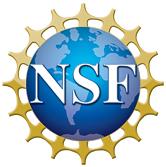 The National Science Foundation (NSF), in partnership with the Bureau of Ocean Energy Management (BOEM), U.S. Environmental Protection Agency (EPA), U.S. Geological Survey (USGS), U.S. Fish and Wildlife Service (FWS), and a consortium of French agencies, has announced a new program under its Science, Engineering, and Education for Sustainability (SEES) initiative focused on the Arctic. This program — dubbed Arctic SEES, or simply ArcSEES — seeks “fundamental research that improves our ability to evaluate the sustainability of the Arctic human-environmental system as well as integrated efforts which will provide community-relevant sustainability pathways and engineering solutions.” As with several SEES solicitations issued in FY 2012, the FY 2013 ArcSEES solicitation offers opportunities for computing researchers.
The National Science Foundation (NSF), in partnership with the Bureau of Ocean Energy Management (BOEM), U.S. Environmental Protection Agency (EPA), U.S. Geological Survey (USGS), U.S. Fish and Wildlife Service (FWS), and a consortium of French agencies, has announced a new program under its Science, Engineering, and Education for Sustainability (SEES) initiative focused on the Arctic. This program — dubbed Arctic SEES, or simply ArcSEES — seeks “fundamental research that improves our ability to evaluate the sustainability of the Arctic human-environmental system as well as integrated efforts which will provide community-relevant sustainability pathways and engineering solutions.” As with several SEES solicitations issued in FY 2012, the FY 2013 ArcSEES solicitation offers opportunities for computing researchers.
In particular, from the solicitation (following the link, emphasis added):
Proposals are welcome which address fundamental and systematic understanding of the sustainability of one or more of the following themes:
- the natural and living environment, which explores the interaction between the social and biophysical systems. Since changes in natural environments, including landscapes, ice, water, and soil may have long-range influence, the focus here is on in-depth understanding of the complex, nonlinear biophysical platform and the human-environmental interchanges that manifest themselves within the Arctic and also between the Arctic and the rest of the globe.
- the built environment, including but not limited to housing and transportation structures, energy and communications technologies, climate-resilient materials, and sustainable observing designs. Proposals that focus on computing and communications technologies to enhance effectiveness, energy efficiency, resilience, and sustainability of built environments are also welcome.
- natural resource development, comprising both the potential positive regional-to-global impacts of Arctic resource development as well as the hazards.
- governance, addressing the interactions between political, economic, scientific, and cultural organizations that govern Arctic futures, from the tribal to the multi-national scale.
Moreover:
Proposers are also encouraged to utilize and synthesize data available through the Arctic Observing Network (AON) via CADIS (Cooperative Arctic Database and Information Service). These data may be used to generate sustainability indicators, develop methodologies for assessing sustainability pathways and identify tipping points and behaviors of the Arctic system. Proposals that study theoretical issues of sustainability pathways, tipping points, or data analysis would benefit from the inclusion of a computer scientist, mathematician or statistician, as appropriate, on their proposing team.
Models which advance understanding of processes that influence sustainability and improve the ability to project and predict sustainable pathways are welcome. These efforts should show demonstrable links to users and how they inform human choices. Models need not focus solely on the Arctic, but should help determine the Arctic’s position in the global system, including feedbacks between global and Arctic environmental and economic change.
Research supported by the ArcSEES program is expected to inform, model, design, and project sustainability pathways using the rapid pace of Arctic change as a real-time laboratory for implementation. Proposals that take a broader Arctic view and reflect balanced, integrated perspectives representing one or more of the social sciences, environmental sciences, engineering, and education communities will be given priority.
Full proposals are due by Sept. 14, 2012. Between five and 15 awards, each at about $2 million over three to five years, are expected to be funded through the ArcSEES program.
To learn more, check out the ArcSEES solicitation. And see our past coverage of NSF’s SEES initiative here.
(Contributed by Erwin Gianchandani, CCC Director)









